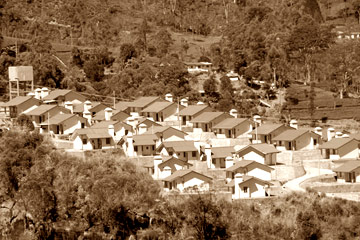A visit to upper Kotmale
by Jayampathy JAYASINGHE
We arrived at the Upper Kotmale Hydropower reservoir dam having
travelled via Avissawella, Yatiyantota, Karavenella, Kitulgala after
staying overnight at Lindula. The downpour that lashed across Keleni
Valley, the Central and Sabaragamuwa provinces on the previous night was
a welcome sign to drought stricken farmers in those areas. The other
benefit was that heavy downpours also fill hydropower reservoirs in the
Central province.
|

Newly built houses for displaced persons.
Pic :Uthpala Sumithaarchchi Ceylon Electricity Board |
At the dam site at the Upper kotmale several Backhoe and Caterpillar
machines were churning up huge mounds of earth at the mouth of the
tunnel across a mountain. Experts say that this is the longest tunnel
ever being built in Sri Lanka covering a distance of 13 kilometres. As
we got closer to the dam site we could hear the drone of drilling
machines at work. There were several of them at work inside the tunnel.
The dam is located in the Southern and the Central mountainous region of
Nuwara-Eliya district. It covers the upstream of Kotmale reservoir on
the Kotmale Oya, a tributary of the Mahaweli Ganga.
The waters of the Kotmale river will be diverted from a height of 900
feet through a tunnel (about 13 kilometres long) and driven to the
powerhouse at the bottom of the foothill where two turbines will be
installed.
Spouts of water streaming
The water gushing down through a tunnel pipe will turn the turbines
generating electricity. The underground powerhouse is located close to
Niyamgandora, a village in the Kotmale area. A visit to the tunnel where
it was being dug beneath a mountain was a frightening experience. As a
safety precaution we all wore headgear and travelled in a van for about
quarter of a mile inside the tunnel which was in pitch darkness. Only
the headlights of the vehicle shone in the darkness that enabled us to
travel. We could see spouts of water streaming along the tunnel walls as
we proceeded. Having travelled nearly 500 metres we alighted from the
van and walked the distance until we came upon a man made platform. From
there we could see almost 600 feet below a flurry of activity. CEB
Engineers and their workforce were attending to work on the spot where
the giant turbines were to be installed.
The Project Director of the Ceylon Electricity Board, Shavindranath
Fernando explaining details of the project to the Sunday Observer said
that 21 displaced families have been re-settled and a further 350
families are to be re-settled when the Kotmale project is completed in
July-August 2011.
The entire cost of the project will be borne by the loan granted to
the Ceylon Electricity Board by Japan on concessionary terms. The
Kotmale project is expected to generate about 150 megawatts which will
be fed in to the national grid.
He said electricity generated from this project will bring down the
cost of a unit on the sliding scale from Rs. 2.70 to cents 90 as time
goes by.
"We are very much concerned about the environment and steps have been
taken not to release any sediments to the river. We have planted around
one hundred thousand plants to mitigate the ill effects caused to the
environment by the project." The Ceylon Electricity Board (CEB) had to
encounter numerous problems when constricting the dam due to the
pressure exerted by various political parties and Non Governmental
Organisations (NGOs) who had a vested interest. An exhaustive
environmental assessment was done by the Central Environmental Authority
and other agencies before the project commenced, he said.
1194 feet deep
We then proceeded 2 kilometres and arrived at the spot where they
were grilling the tunnel to lay the turbines. We met the CEB's Civil
Superintendent, Chryshantha Fernando who showed us the Dam site and the
spot where the river water will enter the gigantic tunnel 13 kilometres
long. "So far we have dug about 2.5 kilometres of the tunnel. "He said
the river was diverted temporarily to allow the construction of the dam
which stands at 1196 feet above the sea level. He said the water will
fill the dam up to 1194 feet and when it goes beyond that the spill
gates will be opened for the water to escape."
The other important aspect of the project is the re-settlement of
displaced families when dam waters swallow their abode. The families who
live in the locality are poor estate labourers. All these years they had
been living in unhygienic linerooms.
We then visited the Rathneelakelle village at the Holyrood estate we
found cottage - like houses built for these people. The houses are
equipped with water and electricity, a pantry and a toilet.
Ceylon Electricity Board's Assistant Re-Settlement officer of the
Upper Kotmale, Sarath Wimalweera said a total of 495 - houses will be
built for displaced families in areas of Talawakele Estate, Walkers
Settlement village, Kumaragama village, Rathneelakelle, Derenipura
village, Middle town, UC settlement, Logi Esatate, Talawakele Nau-Oya
estate.
But in Rathneelakelle alone 117 houses have been built. When the
project is completed 495 houses, 33 shops, 6 workshops, 6 libraries, 2
churches, 3 kovils will be built across the resettlement sites. We then
met A. Mahendramma, a mother who will now occupy a newly built home. Her
house is located on a 7 perch. She said she was happy with the newly
allocated home.
|


